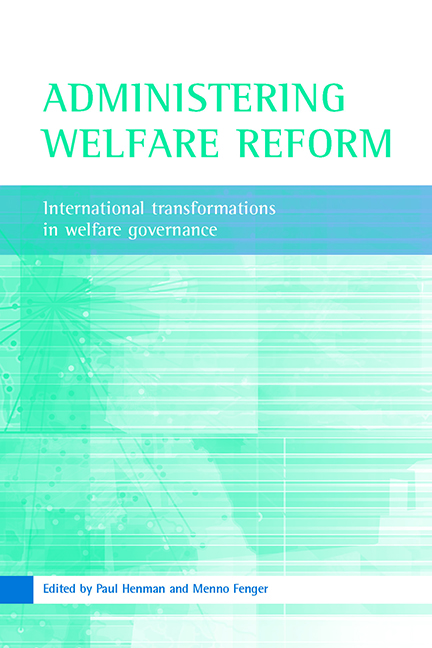Book contents
- Frontmatter
- Contents
- List of tables
- Preface
- Acknowledgements
- List of abbreviations
- Notes on contributors
- one Introduction: administering welfare reform
- two Welfare reform as governance reform: the prospects of a governmentality perspective
- Part One Participants: reforming the agents of welfare delivery
- Part Two Practices: the welfare governance of street-level practices
- Part Three Processes: the changing spaces of welfare governance
- Index
- Also available from The Policy Press
seven - The new governance of Australian welfare: street-level contingencies
Published online by Cambridge University Press: 14 January 2022
- Frontmatter
- Contents
- List of tables
- Preface
- Acknowledgements
- List of abbreviations
- Notes on contributors
- one Introduction: administering welfare reform
- two Welfare reform as governance reform: the prospects of a governmentality perspective
- Part One Participants: reforming the agents of welfare delivery
- Part Two Practices: the welfare governance of street-level practices
- Part Three Processes: the changing spaces of welfare governance
- Index
- Also available from The Policy Press
Summary
Social policy occupies a central position in contemporary theories of governance. It has become commonplace for theorists to describe particular governing paradigms in terms of their specific welfare arrangements and to analyse shifts in governance by making references to changes in social policy. Most readers will be familiar with the distinction that is often drawn between the post-war welfare state, said to be characterised by universal, institutionalised social entitlements, and the newer neo-liberal state, which is distinguished by residual and disciplinary forms of social policy. One of the distinct features of most theories of the new welfare governance is a tendency to promulgate coherent accounts of welfare reform. Neo-liberalism is perhaps the most frequently cited principle underlying current developments, and writers regularly go to considerable lengths to illustrate the ways in which the diverse elements of welfare reform fit together within an ‘advanced liberal’ logic.
Furthermore, there is also a related tendency in this literature to view the processes of social policy reform in linear terms, meaning that theorists see welfare as becoming progressively more neo-liberal, over time. The result is a largely monolithic story about the significant changes that are currently taking place in the welfare systems of the developed world. These theoretical narratives are elegant and influential, but they give us cause to wonder about the extent to which such simple stories capture the complexity of welfare reform. Perhaps one of the most salient questions concerns the degree to which the linear accounts tally with the experiences of actors at different levels and in different parts of social welfare systems.
This chapter reports on the findings of an ethnographic study of street-level experiences of welfare reform in Centrelink, Australia's national benefits agency. The findings indicate that there is considerably more incoherence and contradiction within welfare reform than is suggested by linear neo-liberal accounts of the process. To demonstrate this point, the focus is on three important aspects of Australian welfare reform. The first is the policy concerning sanctions that are applied to beneficiaries who fail to comply with the rules. I argue that, because of conflicting policy developments in this area, we cannot come to any clear conclusions as to whether sanctions have become more or less stringent. The second area of focus concerns the delivery of a personalised, ‘One-to-One Service’.
- Type
- Chapter
- Information
- Administering Welfare ReformInternational Transformations in Welfare Governance, pp. 137 - 160Publisher: Bristol University PressPrint publication year: 2006
- 1
- Cited by



